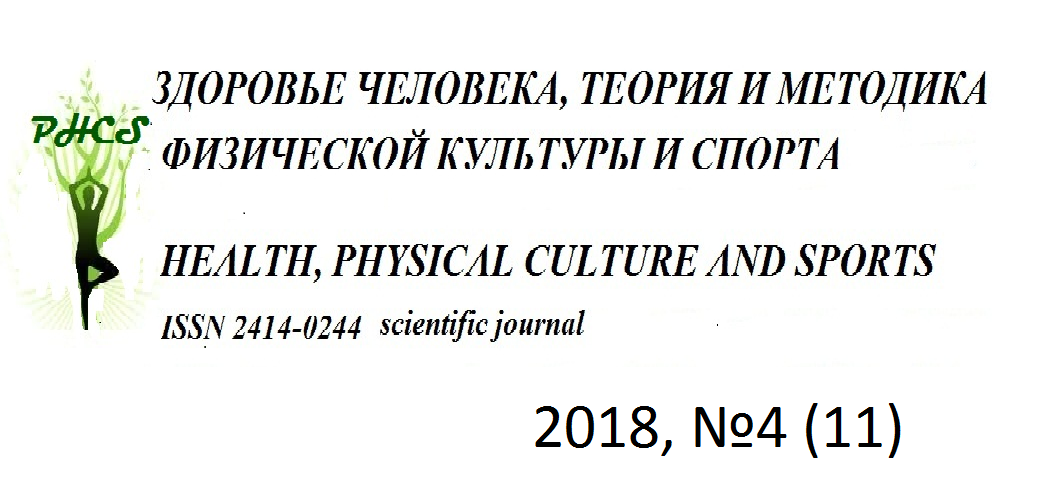INFLUENCE OF THE FACTORS OF THE DAY REGIME ON THE HEALTH OF STUDENTS DEALING WITH SPORTS
Abstract
The article summarizes the theoretical material on the conceptualization of the concepts "Lifestyle" and "Healthy way of life". To date, the issue of maintaining health among young people is very acute, because the health of each person is not only an individual value, it is a social, social value. Many modern young people studying in higher educational institutions are adherents of a certain passive lifestyle, where one of the main elements of social networks and the Internet.
The article analyzes the impact of day-time factors on students. The study was conducted on the basis of the Ural State University of Physical Culture, (Chelyabinsk) at the departments of the natural science cycle (Department of Anatomy, Department of Physiology). In the questioning took part second-year students of the Faculty of Winter Sports and Martial Arts, in qualifications a candidate for master of sports and a master of sports, dischargers.
We found out that the majority of students engaged in sports do not have enough time for leisure, which is associated with a tight busy schedule of study and training, and that many students do not know how to plan the day's schedule correctly - an important condition for high performance, which in turn is one of the basic parameters of health. It was also found that most students practice late sleep and early morning ascent.
In consequence of the tension of the functional reserves and not their full recovery, persistent apathy motives are formed, the unwillingness to attend training sessions and the training process. Distinctions of the regime moments of the student professionally engaged in sports from the regime of the day of the ordinary student are revealed. In the first case, the principles of alternating load and rest are taken into account, in order to avoid overtraining. It is determined that rest at the majority of students is limited to social networks and the Internet.
Downloads
References
2. Петрова Т.Ю. Понятия «здоровый стиль жизни» и «здоровый образ жизни»: общее и особенное // Осовские педагогические чтения "Образование в современном мире: новое время - новые решения". 2014. № 1. С. 573-576.
3. Талагаева Ю.А. Проблема организации рационального режима дня студентов // Экопрофилактика, оздоровительные и спортивно-тренировочные технологии Материалы Международной научно-практической конференции. 2015. С. 269-274.
4. Методика построения рационального режима дня [Электронный ресурс] : методические указания к выполнению контрольной работы для студентов всех форм обучения / сост. : Е.М. Ревенко, Т.Ф. Зелова. − Электрон. дан. − Омск : СибАДИ, 2015. – Режим доступа: свободный после авторизации. – Загл. с экрана
5. Сайфутдинов С.В., Звягина Е.В. Анализ режима сна студентов второго курса УралГУФК // University Stars – 2017: сборник проектов III Международного интеллектуального конкурса студентов, магистрантов, аспирантов, докторантов. Россия, Москва, 30 декабря 2017 г. [Электронный ресурс] / под ред. проф. Т.М. Коноплянник, У.М. Бахтикиреевой, Г.Б. Евгенева. С.9-18
6. Талагаева Ю.А. Использование библиотерапии для профилактики здоровьеразрушающего поведения у студентов // Актуальные проблемы физической культуры и безопасности жизнедеятельности. Сборник научных трудов факультета физической культуры и безопасности жизнедеятельности . Под редакцией Л.В. Кашицыной. Саратов, 2016. С. 129-132.
7. Сипаторова А.М., Мелихов Я.П., Ляшенко А.А. Здоровый образ жизни в жизни студентов оренбургского государственного медицинского университета // Наука и образование сегодня. 2017. № 10 (21). С. 93-94.
8. Сукталиева Э.В. Формирование у студентов готовности к реализации здорового образа жизни в системе вузовского образования // Современные наукоемкие технологии. 2010. № 7. С. 313-316.
9. Наймушина А.Г., Янтимирова Р.А., Сабитов М.А. Здоровый образ жизни как стиль жизни студента // Стратегия развития спортивно-массовой работы со студентами материалы международной научно-практической конференции. 2016. С. 144-148.
10. Воробьева И.Н. Здоровый образ жизни как индикатор для определения базового стиля жизни // Проблемы фундаментальной подготовки в школе и вузе в контексте современности. Межвузовский сборник научных работ VIII Всероссийской научно-практической конференции. Редактор-составитель А.Е. Новиков. 2017. С. 301-303.

An author should not normally publish manuscripts describing essentially the same research in multiple journals or publication venues. Such redundant publication is generally considered to constitute unethical publishing behavior, and if discovered may result in a manuscript under consideration being rejected, or a published article being retracted.
Authors of manuscripts reporting on original research should present an accurate account of the work performed, accompanied by an objective discussion of its significance. Underlying data should be represented accurately in the manuscript. The manuscript should contain sufficient detail and references to permit others to replicate the work. The fabrication of results and the making of fraudulent or knowingly inaccurate statements constitute unethical behavior and may be cause for rejection or retraction of a manuscript or published article.




